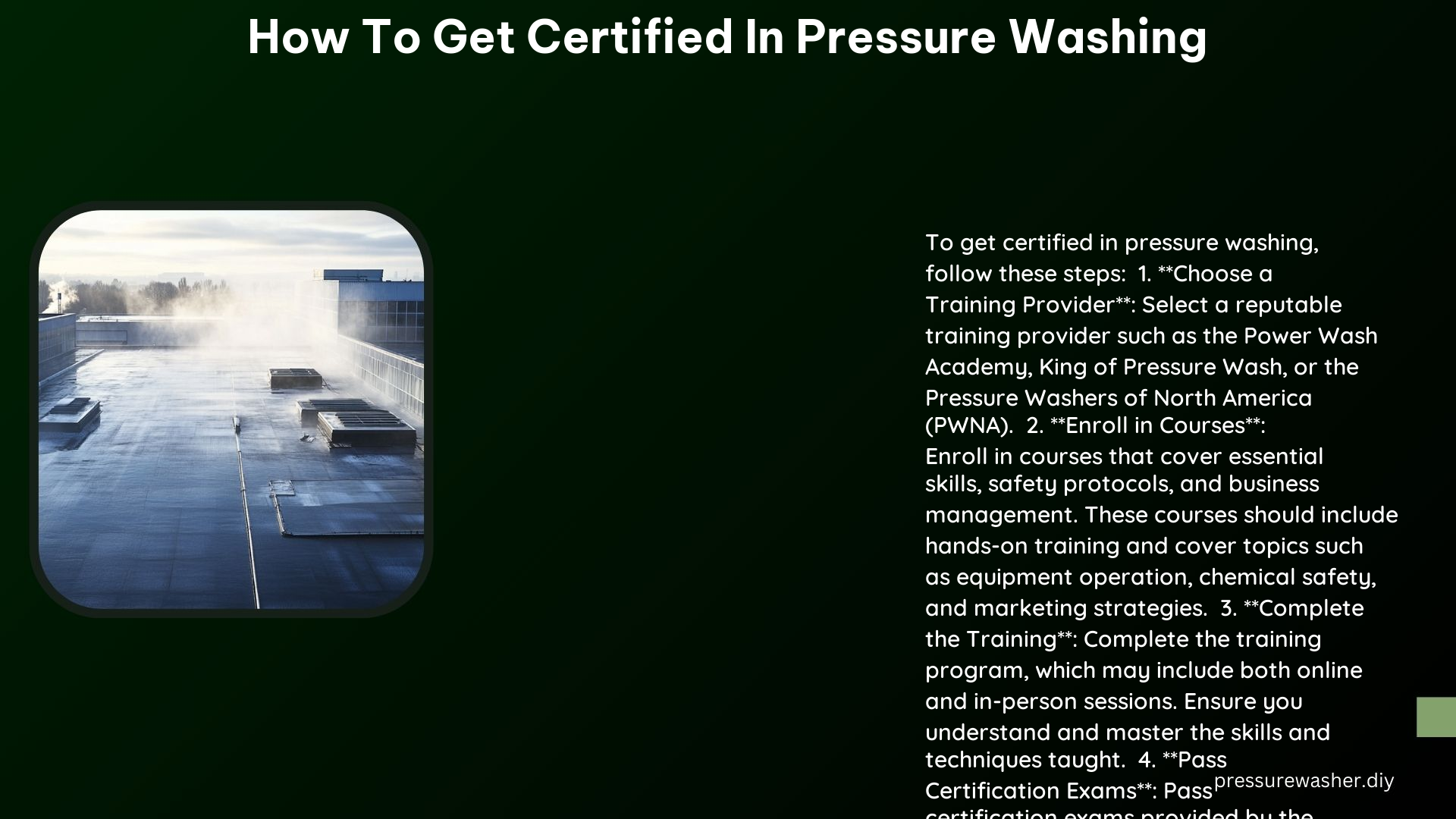Getting certified in pressure washing is a crucial step for individuals and businesses looking to establish credibility, improve safety practices, and stay ahead of the competition. This comprehensive guide will walk you through the process of obtaining various pressure washing certifications, covering the technical specifications, industry-specific requirements, and practical tips to help you succeed.
Choose a Certification Body
The Power Washers of North America (PWNA) is a leading organization that offers a wide range of pressure washing certifications, including:
- House Washing Certification: Covers the fundamentals of cleaning residential homes using pressure washers and 12-volt pump delivery systems.
- Flatwork Certification: Focuses on cleaning flat surfaces, such as driveways, sidewalks, and patios, including the use of wands, surface cleaners, and water recovery methods.
- Fleet Washing Certification: Covers the history of fleet washing, economic opportunities, chemicals, equipment, safety, and the overall process.
Other reputable certification bodies include the Cleaning Industry Management Standard (CIMS) and the International Sanitary Supply Association (ISSA), which offer certifications related to cleaning and maintenance practices.
Select a Training Course

Once you’ve chosen the certification body, it’s time to select a training course that aligns with your goals and experience level. These courses can be found both online and in-person, with the following options available:
- Online Courses: Platforms like the Power Wash Academy offer comprehensive online training programs that cover a range of topics, including equipment safety, marketing strategies, and business management.
- In-Person Training: Organizations like the PWNA and the King of Pressure Wash provide hands-on, in-person training sessions that allow you to gain practical experience and receive personalized guidance from industry experts.
When selecting a course, be sure to review the prerequisites, course content, and certification requirements to ensure it meets your needs.
Meet the Prerequisites
Some certification programs may have specific prerequisites, such as prior experience in the pressure washing industry or the completion of certain training modules. It’s essential to carefully review the requirements and ensure you meet them before enrolling in a course.
Complete the Training Course
Regardless of whether you choose an online or in-person training program, you’ll need to attend all the required sessions and complete the necessary assessments. This may include hands-on demonstrations, written exams, and practical evaluations to assess your knowledge and skills.
Pass the Certification Exam
After successfully completing the training course, you’ll need to pass a certification exam to demonstrate your proficiency in pressure washing. The exam may cover a range of topics, including:
- Equipment Knowledge: Familiarity with pressure washers, pumps, hoses, and other essential equipment.
- Safety Protocols: Understanding safety practices, such as ladder and roof safety, chemical handling, and respiratory protection.
- Business Management: Knowledge of marketing strategies, sales techniques, and business operations.
Maintain Your Certification
Many pressure washing certifications require periodic renewal, typically through the completion of continuing education courses or attendance at industry workshops. It’s essential to stay up-to-date with the latest trends, technologies, and best practices to maintain your certification and ensure your skills remain relevant.
DIY Tips for Aspiring Pressure Washers
If you’re just starting your journey in the pressure washing industry, here are some DIY tips to help you get started:
- Start with Online Resources: Utilize online forums, YouTube channels, and blogs to learn the basics of pressure washing and soft washing techniques.
- Practice and Build Experience: Gain hands-on experience by practicing on your own equipment and working with experienced professionals in the field.
- Join Industry Associations: Joining organizations like the PWNA can provide access to training resources, networking opportunities, and industry updates, helping you stay informed and connected.
Reference Links
- Pressure Washing Online Training Courses
- Power Wash Academy Courses
- PWNA PowerClean Training
- King of Pressure Wash In-Person Training
- Power Wash Academy
By following this comprehensive guide, you’ll be well on your way to obtaining the necessary certifications to establish your credibility, ensure safety, and position your pressure washing business for success in the industry.
